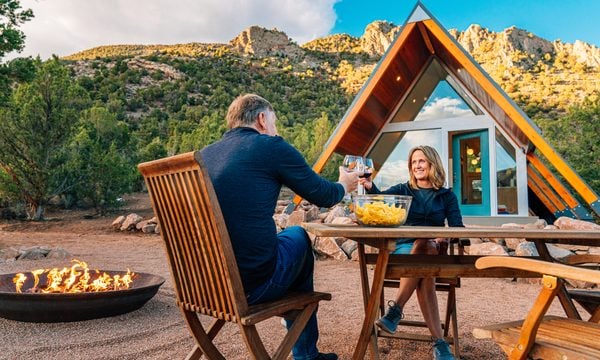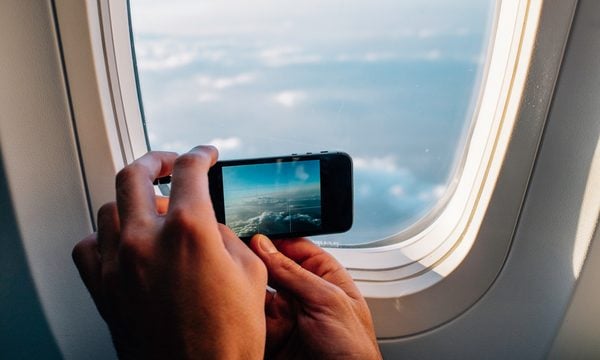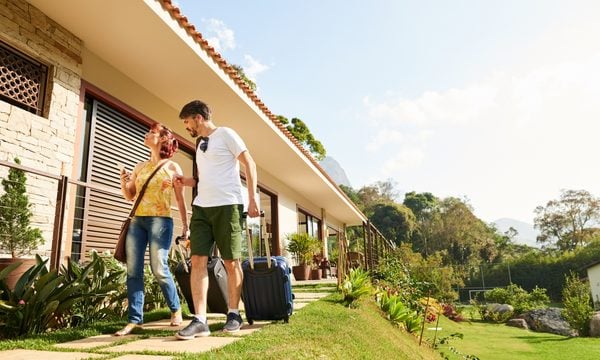How Does Vrbo Work?
Long a fixture on the vacation rental scene, Vrbo can be a good deal if you know what you're doing.
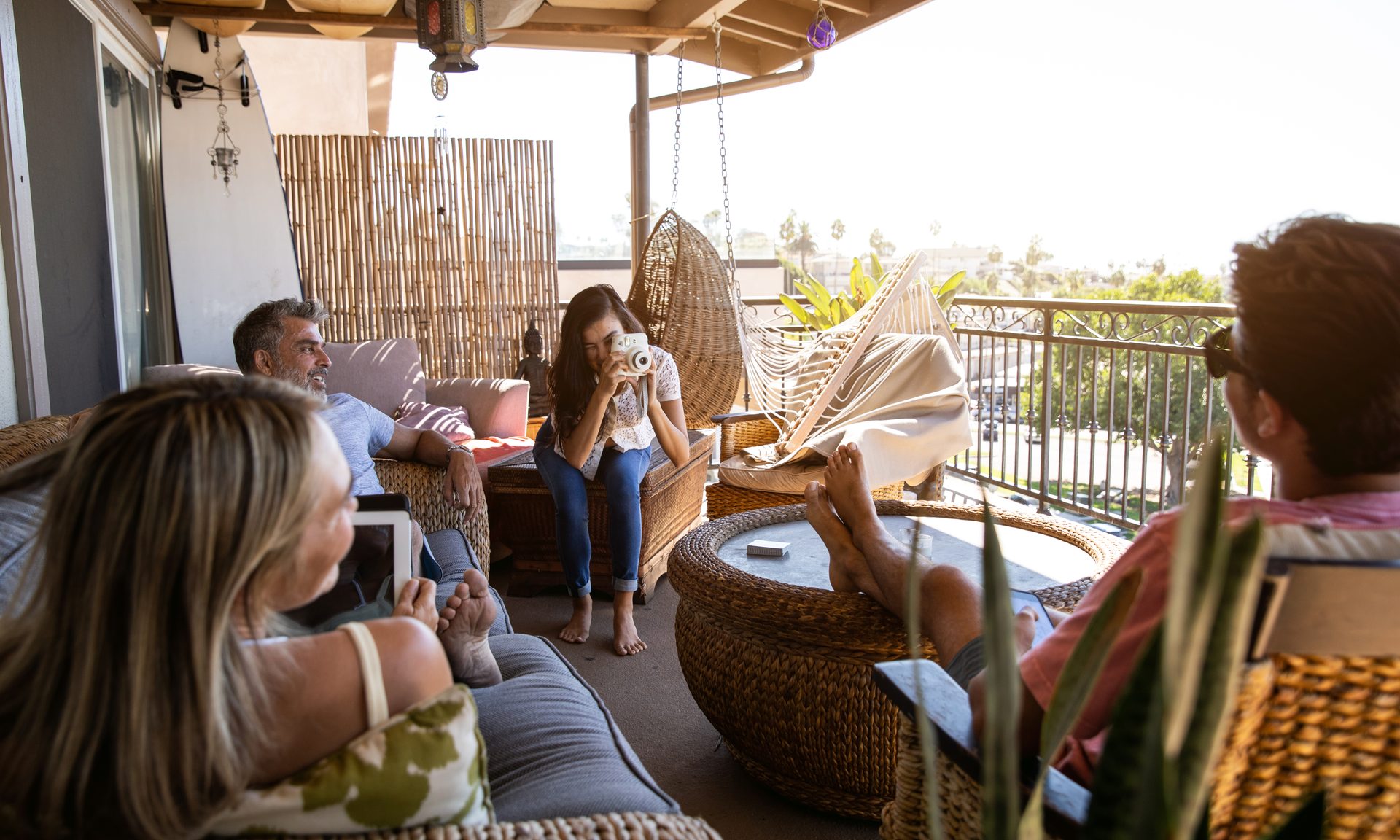
Many or all of the products on this page are from partners who compensate us when you click to or take an action on their website, but this does not influence our evaluations or ratings. Our opinions are our own.
Whether you're going on vacation, looking for medium-term apartment rental while you work and travel, or just simply prefer to stay in unique accommodations rather than hotels, you have options besides Airbnb. One of those choices is Vrbo, an online marketplace that connects homeowners who are renting out their place with people looking for vacation rentals.
Furthermore, Vrbo participates in One Key Rewards, a unified loyalty program allowing travelers to earn and redeem rewards across Vrbo, Expedia and Hotels.com. If you're considering renting a vacation rental on Vrbo, here's what you should know before you book.
On this page
- What is Vrbo?
- How does Vrbo work?
- How to rent on Vrbo
- Is Vrbo safe?
- How to cancel a Vrbo reservation
- What to do if you have issues with a Vrbo reservation
- Can you get a refund if it rains? Vrbo's WeatherPromise partnership
- How to save money on Vrbo
- Is Vrbo better than Airbnb?
- Vrbo vacation rentals, recapped
What is Vrbo?
Vrbo is short for Vacation Rentals by Owner, and it's a website that does exactly what it sounds like. Vrbo is an online vacation rental site where property owners can list their homes for rent, travelers can book them and Vrbo handles the transaction.
Vrbo properties range from massive cabins in the mountains ideal for a group ski trip to more conventional homes in the suburbs to unique dwellings, like Costa Rica's "Cockpit Cabana," where you actually sleep inside of an airplane.

Vrbo launched in 1995 and was acquired by HomeAway in 2006. After Expedia Group acquired HomeAway in 2015, Vrbo fell under the Expedia umbrella. The two brands merged into a single Vrbo website in 2020. In 2023, Vrbo, Expedia and Hotels.com launched One Key, a loyalty program allowing members to earn and redeem rewards across all three platforms — something competitor Airbnb still doesn't offer.
» Learn more: The One Key travel rewards guide
Vacation rentals can be cheaper than hotels, especially for groups, since multiroom properties let you split costs. They also commonly include amenities like kitchens and washing machines. And in remote areas not served by hotels, a Vrbo might be your only real option.
That said, renting on Vrbo isn't always as seamless as booking a hotel. Unless a property is listed as "Instant Book," you'll need to submit a request to the owner and wait for approval. Some properties have minimum stay requirements. And since you're staying in a nonstandard property, expect some inconsistency — in amenities, check-in logistics and overall condition — that you wouldn't encounter at a chain hotel.

By signing up, you will receive newsletters and promotional content and agree to our Terms of Use and acknowledge the data practices in our Privacy Policy. You may unsubscribe at any time.
How does Vrbo work?
A key differentiator: Vrbo only lists entire, private homes. Unlike Airbnb, which allows shared spaces, every Vrbo rental means you'll have the property to yourself — no owner or other guests sharing the space with you.
Listings vary in quality, amenities, cancellation policies and maximum guest counts. Vrbo's platform has around 2 million hosts worldwide, compared to the roughly 4 million Airbnb claims.
How to rent on Vrbo
Set up an account on Vrbo
Creating a Vrbo account requires only a name and email address. From there, you can optionally add a short bio, a photo and verified identity information (address and birth date). Completing those optional fields is worth doing — most rentals require you to request a reservation, and a verified account meaningfully improves your odds of acceptance.
Hosts won't see your personal identity details; they'll only see that you're verified, along with basic contact information.
Finding your rental
Enter your destination, dates and number of guests, then use Vrbo's filters to narrow results. Standard filters cover bedrooms, price and availability. More specific filters let you search by property type (including castles, lodges and yachts), nearby activities (skiing, fishing, theme parks) and features like pools or outdoor grills.
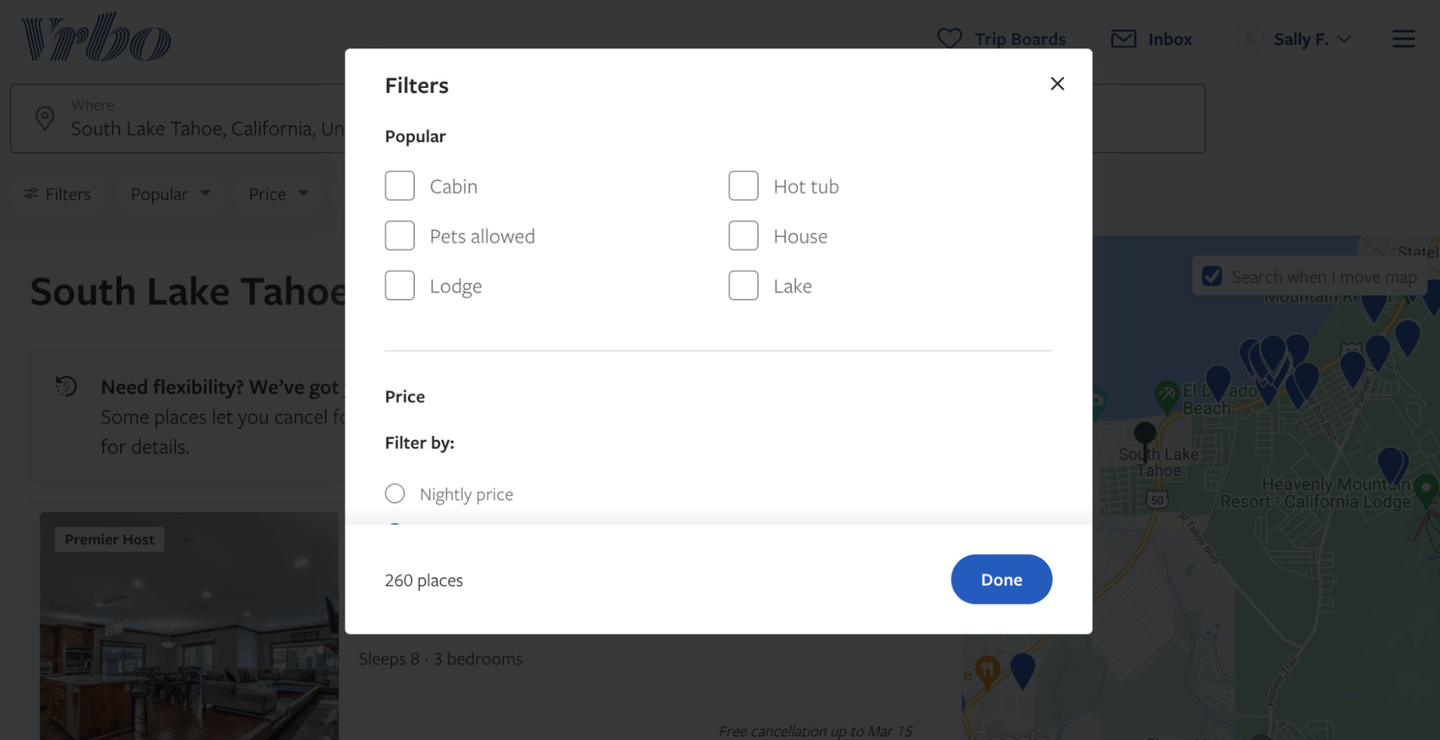
A few newer tools can speed up your research:
Premier Host
Vrbo recently tightened its "Premier Host" requirements. Starting in early 2026, individual listings — not just hosts — must maintain a 99% acceptance rate, 0% cancellation rate and a 9.2+ review rating to earn the badge. Previously, a host with multiple properties could earn Premier status for all their listings even if some underperformed. Now each listing stands on its own.
Loved by Guests
The "Loved by Guests" badge filters for properties with ratings of 9.4 or higher across overall experience, cleanliness, location, listing accuracy and ease of check-in.
AI tools
Vrbo has also added AI-powered tools including guest review summaries, a property Q&A function that pulls from verified reviews, and AI-highlighted property features. These can be useful for initial screening, but read actual recent reviews yourself — AI summaries can miss nuance or downplay recurring complaints.
🤓 Nerdy Tip
Base your decision on the property description, not just the photos. A beautifully staged listing doesn't guarantee a great stay, and a poorly photographed home can still be excellent. Also review the cancellation policy before booking. The strictest policies are entirely nonrefundable; the most flexible offer a full refund if you cancel at least 14 days before check-in.
Booking and paying for your Vrbo
Booking falls into two categories:
- 24-Hour Confirmation: Submit a request to book, and the host has 24 hours to accept or decline.
- Instant Book: Your reservation is confirmed immediately without waiting for host approval.
On top of the nightly rate, expect additional fees: most properties include a cleaning fee set by the host, plus Vrbo's own service fee. Some hosts also require a refundable damage deposit or purchase of property damage protection.
Vrbo handles all transactions and accepts Visa, Mastercard and American Express. Never agree to pay a host separately via cash, check or money transfer.
Some properties require full payment upfront; others allow two or three installments. Vrbo also partners with Affirm, a point-of-sale loan company, which lets qualified U.S. customers pay over time on select properties — even past the dates of your stay.
🤓 Nerdy Tip
Don't consent if the host messages you to pay separately. Hosts who request cash, check or money transfers could be scamming you. Checking in and out
Three days before your stay, Vrbo sends check-in information from the host, including access codes or key instructions, the property address, cancellation policy and host contact details. Most properties use a lockbox or a door code for entry.
Checkout procedures vary. Your host may have specific cleanup requests, though many simply ask that you leave the house as is. Details typically arrive before or upon your arrival.
Is Vrbo safe?
In theory, yes — Vrbo is a legitimate service with safety precautions in place. But since you're entering a stranger's home (and they're trusting strangers in theirs), some risks exist that you wouldn't encounter at a traditional hotel.
Background checks: Vrbo does not conduct background checks on guests. Airbnb does. Vrbo instead relies on its Verified Identity and Premier Host badge systems as proxies for trustworthiness.
Payment protection: Your money is protected against fraud as long as you pay through Vrbo. If funds end up in the wrong hands, Vrbo will refund you. Never make a deal outside the app.
Natural disasters and travel advisories: If a natural disaster affects your destination, contact your host first, then Vrbo through its natural disaster page if issues persist.
Surveillance devices: Vrbo prohibits surveillance inside homes (with limited exceptions for disclosed smart devices and baby monitors). Outdoor security cameras are permitted as long as their locations and coverage are disclosed and areas with a reasonable expectation of privacy — like outdoor showers — are excluded.
How to cancel a Vrbo reservation
To cancel, sign in, go to "My Trips" and select "Change or cancel trip." You'll be shown the property's cancellation policy. If you're automatically eligible for a full refund, you'll see a "Cancel booking" button. Otherwise, you'll submit a cancellation request to the host. Policies are spelled out on the listing before you book, so review them carefully.
What to do if you have issues with a Vrbo reservation
If your rental has serious problems or the host is unresponsive, Vrbo offers VrboCare — the company's rebrand of its Book with Confidence Guarantee, included automatically with every booking at no extra cost.
VrboCare covers host-initiated cancellations, check-in issues, fraud and significant property misrepresentation. Vrbo recently expanded its rebooking assistance window from 30 days to 90 days before check-in, meaning if your host cancels up to three months out, Vrbo's agents will help you find alternative accommodations.
That said, there are real limitations: Vrbo will help you find a comparable property but won't cover any price difference if the replacement costs more than your original booking. VrboCare also doesn't cover bad weather, natural disasters (unless you're already at the destination), or buyer's remorse. And while the policy covers "significant" property misrepresentation, Vrbo hasn't publicly defined what qualifies.
For support, Vrbo offers 24/7 customer service through the app's Help Center, the VrboCare page, your booking confirmation email, or live chat on the homepage.
Can you get a refund if it rains? Vrbo's WeatherPromise partnership
VrboCare won't help you if the weather simply doesn't cooperate — but a new Vrbo partnership might. In February 2026, Vrbo announced a partnership with WeatherPromise, a weather protection product that automatically pays out guests if rainfall exceeds a set threshold during their stay.
Unlike travel insurance or credit card trip protections — which cover cancellations, flight delays, medical emergencies and lost baggage — WeatherPromise is specifically for bad weather that ruins a trip you still went on. You take the trip; if it rains too much, you get your money back. The two products address different scenarios, and many travelers use both.
How it works: At checkout on eligible properties, you'll see a WeatherPromise offer showing how many rainy days are predicted for your trip and the specific rainfall threshold that would trigger a payout. Add it by checking a box. Once your trip begins, WeatherPromise automatically monitors real-time weather at your destination — no claims process required. If the threshold is hit, the company proactively contacts you, you enter your bank details, and the payout arrives within two to three business days.
The payout equals the full cost of your Vrbo stay, issued as a direct cash payment — not a refund to your original payment method.
What counts as a "rainy day": Each WeatherPromise is customized based on historical weather data for your specific destination and dates. The threshold is typically defined as a certain number of hours of rain above a set intensity (for example, 0.04 inches per hour), measured during daytime hours in local time. The exact conditions are shown before you purchase and spelled out in your confirmation email.
What it costs: Pricing varies based on your destination, travel dates and trip length. Most WeatherPromises run between 3% and 8% of the covered trip cost, according to WeatherPromise. You can cancel within 72 hours of purchase for a full refund; if your Vrbo booking is canceled for a full refund, your WeatherPromise is automatically canceled and refunded too.
Availability: WeatherPromise is currently available to U.S. travelers on select Vrbo properties across nearly 70 countries.
🤓 Nerdy Tip
WeatherPromise makes the most sense for outdoor- or beach-dependent trips where rain would meaningfully undercut the experience. For city trips where you'd be indoors much of the time anyway, it's probably not worth the added cost. How to save money on Vrbo
Vrbo prices are set by hosts — not Vrbo itself — so most tricks for saving money on hotels won't necessarily apply. Still, here are five ways to save money on Vrbo rentals:
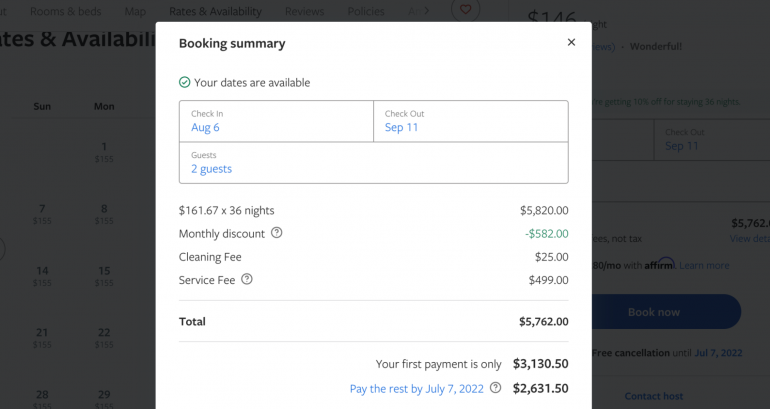
1. Book a longer stay
Some hosts offer weekly or monthly discounts at rates they set. If a property offers one and your stay qualifies, the discount is applied automatically at checkout.
2. Redeem credit card travel statement credits for Vrbo stays
A few credit cards offer travel statement credits covering various travel expenses and typically include Vrbo rentals, including the Chase Sapphire Reserve®.
3. Sign up for One Key Rewards
The One Key loyalty program lets you earn 2% OneKeyCash per $1 spent on Vrbo bookings (on the room cost only, excluding fees and taxes) and accumulate elite status redeemable across Vrbo, Expedia and Hotels.com. Because fees and taxes can make up a significant portion of your total booking cost, your effective earn rate is often closer to 1% in practice — still worth having, just not quite the headline number.
4. Earn points by paying with a travel rewards credit card
Sure, this tip won't save you money upfront, but it'll earn you travel rewards to cover future trips: Pay for your Vrbo with a travel rewards credit card.
If you've got a travel credit card that offers bonus points on travel spending, then Vrbos typically fall under the travel umbrella and qualify you for an elevated earn rate. Read your own credit card's terms, as some issuers define travel differently, or might only give you bonus points for travel booked directly through their travel portals (in which case a Vrbo wouldn't qualify).
Premium travel credit cards can be particularly rewarding towards your travel spending. For example, the Capital One Venture X Rewards Credit Card earns 2 miles per $1 on all purchases. If high annual fees aren't your jam, there are plenty of travel credit cards with no annual fee to pick from.
4. Earn United miles by connecting your accounts
Your Vrbo stays are an easy way to rack up United Airlines MileagePlus miles, which you can accumulate and redeem for free flights. You'll need to book through United's dedicated Vrbo webpage to qualify to earn points, and you'll also have to enter your MileagePlus membership number in the correct field.
When you do, you'll earn 3 MileagePlus award miles per $1 spent on the cost of the vacation rental after the completed stay, excluding taxes and fees.
So if you book a $1,000 stay, you will earn 3,000 miles. Since NerdWallet values United miles at 1.2 cents each, those 3,000 miles are worth $36. Although it's not a significant amount, connecting your accounts can be an easy way to accumulate some extra United miles with minimal effort.
5. Travel during shoulder season
Vrbo hosts set their own pricing and typically charge more during peak demand. A ski cabin costs more in winter; a beach house costs more in summer. Traveling in shoulder season — when you can still access the destination's highlights with thinner crowds — can unlock meaningfully lower rates.
Is Vrbo better than Airbnb?
The two platforms have a few key differences. Airbnb offers standalone homes, shared spaces and hotel rooms; Vrbo lists only standalone accommodations. Airbnb has more total properties, but Vrbo has more robust search and filtering capabilities. When we've compared prices head-to-head, bookings tend to be priced similarly between the two.
Vrbo's One Key loyalty program is a meaningful differentiator — Airbnb has no equivalent rewards program. But Airbnb does conduct background checks on guests; Vrbo does not.
Want to know more about how these two companies stack up against each other? Check out our comparison guide here: Airbnb vs. Vrbo: which is better for travelers?
Vrbo vacation rentals, recapped
If you're renting a vacation home, Vrbo offers a wide range of properties worldwide with strong search tools, solid consumer protections and a loyalty program that rewards repeat use. New features like WeatherPromise add a layer of protection that's genuinely unique in the vacation rental space.
Just go in with realistic expectations: cancellation policies, check-in logistics and property quality vary host by host. VrboCare provides real protections but has limitations worth understanding before you assume it covers everything. Read reviews, verify policies before booking, and you'll be well positioned for a smooth stay.
How to maximize your rewards
You want a travel credit card that prioritizes what’s important to you. Here are some of the best travel credit cards of 2026:
- Flexibility, point transfers and a large bonus: Chase Sapphire Preferred® Card
- No annual fee: Wells Fargo Autograph® Card
- Flat-rate travel rewards: Capital One Venture Rewards Credit Card
- Bonus travel rewards and high-end perks: Chase Sapphire Reserve®
- Luxury perks: American Express Platinum Card®
- Business travelers: Ink Business Preferred® Credit Card
Article sources
NerdWallet writers are subject matter authorities who use primary,
trustworthy sources to inform their work, including peer-reviewed
studies, government websites, academic research and interviews with
industry experts. All content is fact-checked for accuracy, timeliness
and relevance. You can learn more about NerdWallet's high
standards for journalism by reading our
editorial guidelines.
On this page
- What is Vrbo?
- How does Vrbo work?
- How to rent on Vrbo
- Is Vrbo safe?
- How to cancel a Vrbo reservation
- What to do if you have issues with a Vrbo reservation
- Can you get a refund if it rains? Vrbo's WeatherPromise partnership
- How to save money on Vrbo
- Is Vrbo better than Airbnb?
- Vrbo vacation rentals, recapped
Limited Time Only: Earn $1,000 Toward Travel!
Capital One Venture Rewards Credit Card 
Travel

For a limited time, the
Capital One Venture Rewards Credit Card is offering new cardholders an especially rich bonus: Enjoy $250 to use on Capital One Travel in your first cardholder year, plus earn 75,000 bonus miles once you spend $4,000 on purchases within the first 3 months from account opening - that’s equal to $1,000 in travel!
More like this
Related articles



